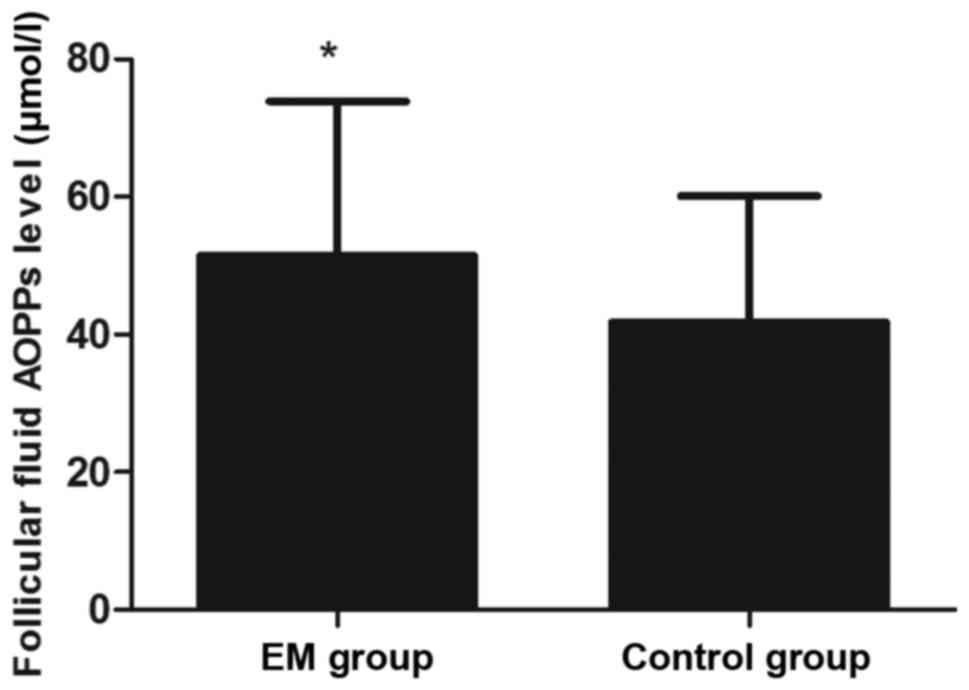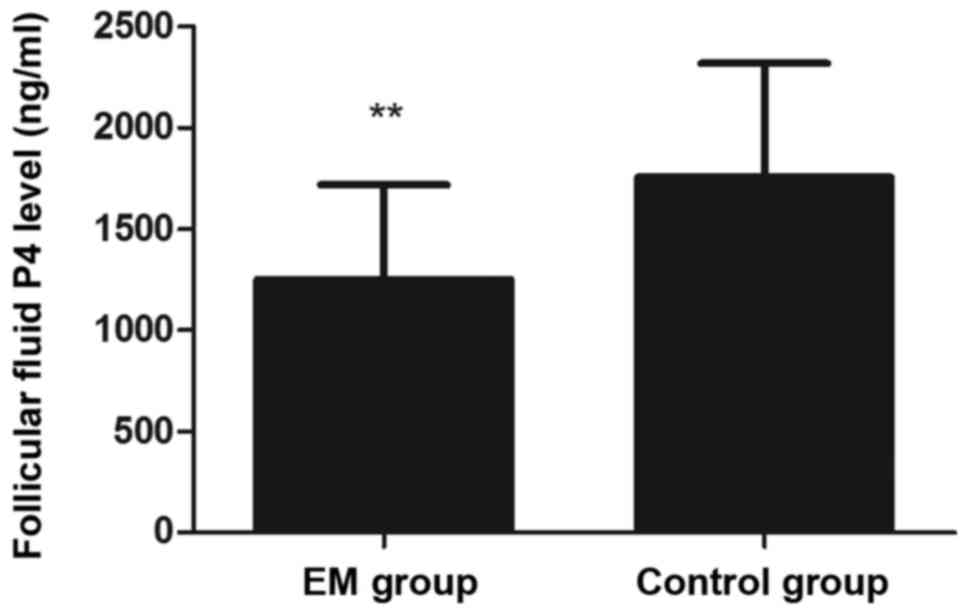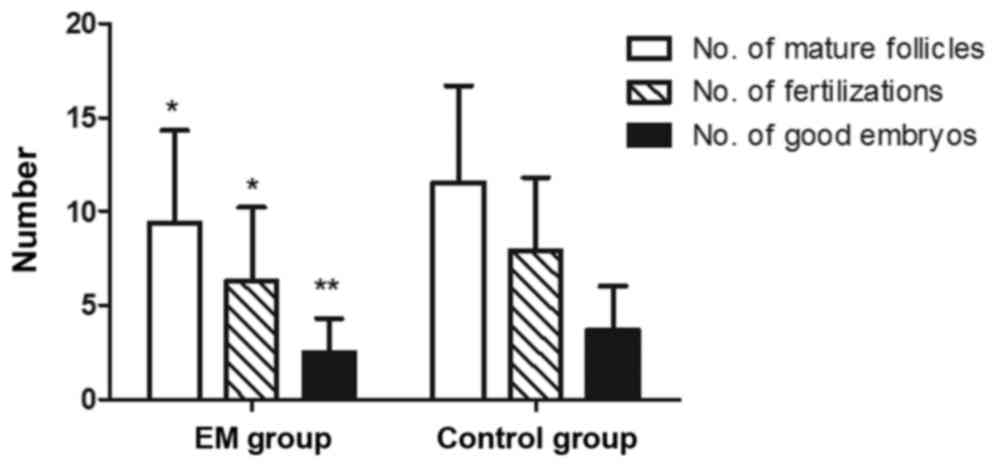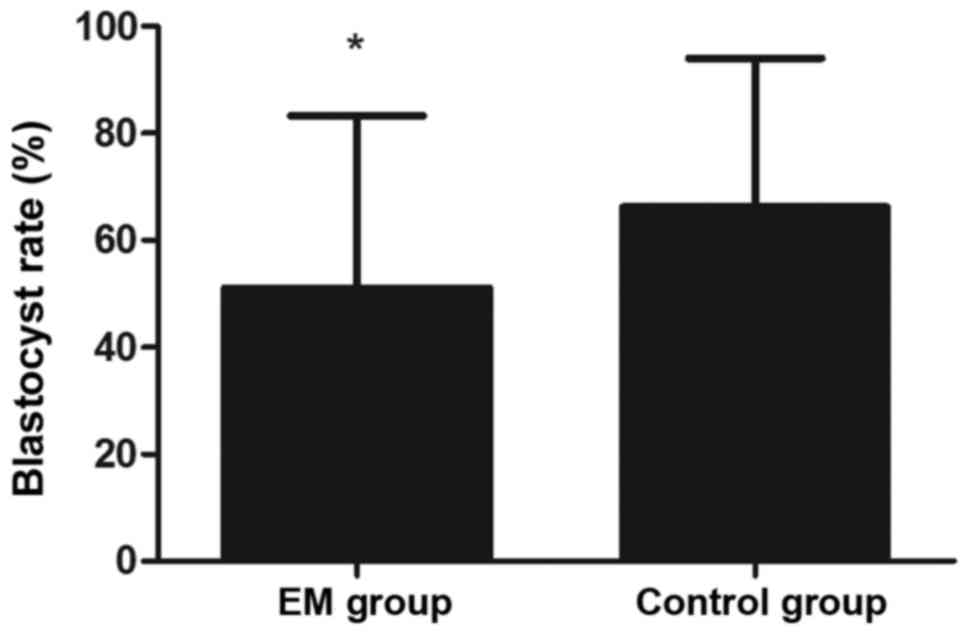|
1
|
Agarwal A, Gupta S, Abdel-Razek H, Krajcir
N and Athayde K: Impact of oxidative stress on gametes and embryos
in an ART Laboratory. Clin Embryol. 9:5–22. 2006.
|
|
2
|
Esfandiari N, Falcone T, Agarwal A,
Attaran M, Nelson DR and Sharma RK: Protein supplementation and the
incidence of apoptosis and oxidative stress in mouse embryos.
Obstet Gynecol. 105:653–660. 2005. View Article : Google Scholar : PubMed/NCBI
|
|
3
|
Liu XM, Zhang YP, Ji SY, Li BT, Tian X, Li
D, Tong C and Fan HY: Mitoguardin-1 and −2 promote maturation and
the developmental potential of mouse oocytes by maintaining
mitochondrial dynamics and functions. Oncotarget. 7:1155–1167.
2016. View Article : Google Scholar : PubMed/NCBI
|
|
4
|
Zhang X, Wu XQ, Lu S, Guo YL and Ma X:
Deficit of mitochondria-derived ATP during oxidative stress impairs
mouse MII oocyte spindles. Cell Res. 16:841–850. 2006. View Article : Google Scholar : PubMed/NCBI
|
|
5
|
International Classification of Diseases
10th edition (ICD-10). World Human Organization; Apr 16–2015
|
|
6
|
D'Hooghe TM, Debrock S, Hill JA and
Meuleman C: Endometriosis and subfertility: Is the relationship
resolved? Semin Reprod Med. 21:243–254. 2003. View Article : Google Scholar : PubMed/NCBI
|
|
7
|
Bérubé S, Marcoux S, Langevin M and Maheux
R: Fecundity of infertile women with minimal or mild endometriosis
and women with unexplained infertility. The Canadian collaborative
group on endometriosis. Fertil Steril. 69:1034–1041. 1998.
View Article : Google Scholar : PubMed/NCBI
|
|
8
|
Pellicer A, Navarro J, Bosch E, Garrido N,
Garcia-Velasco JA, Remohi J and Simón C: Endometrial quality in
infertile women with endometriosis. Ann N Y Acad Sci. 943:122–130.
2001. View Article : Google Scholar : PubMed/NCBI
|
|
9
|
Mansour G, Sharma RK, Agarwal A and
Falcone T: Endometriosisinduced alterations in mouse metaphase II
oocyte microtubules and chromosomal alignment: A possible cause of
infertility. Fertil Steril. 94:1894–1899. 2010. View Article : Google Scholar : PubMed/NCBI
|
|
10
|
Fadhlaoui A, Bouquet de la Jolinière J and
Feki A: Endometriosis and infertility: How and when to treat? Front
Surg. 1:242014. View Article : Google Scholar : PubMed/NCBI
|
|
11
|
Lessey BA, Lebovic DI and Taylor RN:
Eutopic endometrium in women with endometriosis: Ground zero for
the study of implantation defects. Semin Reprod Med. 31:109–124.
2013. View Article : Google Scholar : PubMed/NCBI
|
|
12
|
Basile N, Mdel C Nogales, Bronet F,
Florensa M, Riqueiros M, Rodrigo L, Garcia-Velasco J and Meseguer
M: Increasing the probability of selecting chromosomally normal
embryos by time-lapse morphokinetics analysis. Fertil Steril.
101:699–704. 2014. View Article : Google Scholar : PubMed/NCBI
|
|
13
|
Xu B, Guo N, Zhang XM, Shi W, Tong XH,
Iqbal F and Liu YS: Oocyte quality is decreased in women with
minimal or mild endometriosis. Sci Rep. 5:107792015. View Article : Google Scholar : PubMed/NCBI
|
|
14
|
Goud PT, Goud AP, Joshi N, Puscheck E,
Diamond MP and AbuSoud HM: Dynamics of nitric oxide, altered
follicular microenvironment, and oocyte quality in women with
endometriosis. Fertil Steril. 102:151–159. 2014. View Article : Google Scholar : PubMed/NCBI
|
|
15
|
Prieto L, Quesada JF, Cambero O, Pacheco
A, Pellicer A, Codoceo R and Garcia-Velasco JA: Analysis of
follicular fluid and serum markers of oxidative stress in women
with infertility related to endometriosis. Fertil Steril.
98:126–130. 2012. View Article : Google Scholar : PubMed/NCBI
|
|
16
|
Singh AK, Chattopadhyay R, Chakravarty B
and Chaudhury K: Markers of oxidative stress in follicular fluid of
women with endometriosis and tubal infertility undergoing IVF.
Reprod Toxicol. 42:116–124. 2013. View Article : Google Scholar : PubMed/NCBI
|
|
17
|
Da Broi MG, Malvezzi H, Paz CC, Ferriani
RA and Navarro PA: Follicular fluid from infertile women with mild
endometriosis may compromise the meiotic spindles of bovine
metaphase II oocytes. Hum Reprod. 29:315–323. 2014. View Article : Google Scholar : PubMed/NCBI
|
|
18
|
Santanam N, Zoneraich N and Parthasarathy
S: Myeloperoxidase as a potential target in women with
endometriosis undergoing IVF. Reprod Sci. 24:619–626. 2017.
View Article : Google Scholar : PubMed/NCBI
|
|
19
|
Colombo G, Clerici M, Giustarini D,
Portinaro N, Badalamenti S, Rossi R, Milzani A and Dalle-Donne I: A
central role for intermolecular dityrosine cross-linking of
fibrinogen in high molecular weight advanced oxidation protein
product (AOPP) formation. Biochim Biophys Acta. 1850:1–12. 2015.
View Article : Google Scholar : PubMed/NCBI
|
|
20
|
Witko-Sarsat V, Gausson V, Nguyen AT,
Touam M, Drüeke T, Santangelo F and Descamps-Latscha B:
AOPP-induced activation of human neutrophil and monocyte oxidative
metabolism: A potential target for N-acetylcysteine treatment in
dialysis patients. Kidney Int. 64:82–91. 2003. View Article : Google Scholar : PubMed/NCBI
|
|
21
|
Santulli P, Chouzenoux S, Fiorese M,
Marcellin L, Lemarechal H, Millischer AE, Batteux F, Borderie D and
Chapron C: Protein oxidative stress markers in peritoneal fluids of
women with deep infiltrating endometriosis are increased. Hum
Reprod. 30:49–60. 2015. View Article : Google Scholar : PubMed/NCBI
|
|
22
|
Li HY, Hou FF, Zhang X, Chen PY, Liu SX,
Feng JX, Liu ZQ, Shan YX, Wang GB, Zhou ZM, et al: Advanced
oxidation protein products accelerate renal fibrosis in a remnant
kidney model. J Am Soc Nephrol. 18:528–538. 2007. View Article : Google Scholar : PubMed/NCBI
|
|
23
|
Liu SX, Hou FF, Guo ZJ, Nagai R, Zhang WR,
Liu ZQ, Zhou ZM, Zhou M, Xie D, Wang GB and Zhang X: Advanced
oxidation protein products accelerate atherosclerosis through
promoting oxidative stress and inflammation. Arterioscler Thromb
Vasc Biol. 26:1156–1162. 2006. View Article : Google Scholar : PubMed/NCBI
|
|
24
|
Cao W, Xu J, Zhou ZM, Wang GB, Hou FF and
Nie J: Advanced oxidation protein products activate intrarenal
renin-angiotensin system via a CD36-mediated, redox-dependent
pathway. Antioxid Redox Signal. 18:19–35. 2013. View Article : Google Scholar : PubMed/NCBI
|
|
25
|
Wu Q, Zhong ZM, Pan Y, Zeng JH, Zheng S,
Zhu SY and Chen JT: Advanced oxidation protein products as a novel
marker of oxidative stress in postmenopausal osteoporosis. Med Sci
Monit. 21:2428–2432. 2015. View Article : Google Scholar : PubMed/NCBI
|
|
26
|
Moti M, Amini L, Ardakani SS Mirhoseini,
Kamalzadeh S, Masoomikarimi M and Jafarisani M: Oxidative stress
and anti-oxidant defense system in Iranian women with polycystic
ovary syndrome. Iran J Reprod Med. 13:373–378. 2015.PubMed/NCBI
|
|
27
|
Santulli P, Borghese B, Lemaréchal H,
Leconte M, Millischer AE, Batteux F, Chapron C and Borderie D:
Increased serum oxidative stress markers in women with uterine
leiomyoma. PLoS One. 8:e720692013. View Article : Google Scholar : PubMed/NCBI
|
|
28
|
Jana SK, K NB, Chattopadhyay R,
Chakravarty B and Chaudhury K: Upper control limit of reactive
oxygen species in follicular fluid beyond which viable embryo
formation is not favorable. Reprod Toxicol. 29:447–451. 2010.
View Article : Google Scholar : PubMed/NCBI
|
|
29
|
Song YL, Quan S, Tian JW, Li H, Chen SM
and Xing FQ: Relationship between protein oxidation levels in the
follicular fluid and the outcome parameters of in vitro
fertilization-embryo transplantation. Nan Fang Yi Ke Da Xue Xue
Bao. 29:160–163. 2009.(In Chinese). PubMed/NCBI
|
|
30
|
World Health Organization, . WHO
Laboratory Manual for the Examination Human Semen and
Sperm-cervical Mucus Interaction. 4th. Cambridge University Press;
Oxford, UK: 2010
|
|
31
|
Giorgi VS, Da Broi MG, Paz CC, Ferriani RA
and Navarro PA: N-acetyl-cysteine and l-carnitine prevent meiotic
oocyte damage induced by follicular fluid from infertile women with
mild endometriosis. Repro Sci. 23:342–351. 2016. View Article : Google Scholar
|
|
32
|
Witko-Sarsat V, Friedlander M,
Capeillère-Blandin C, Nguyen-Khoa T, Nguyen AT, Zingraff J, Jungers
P and Descamps-Latscha B: Advanced oxidation protein products as a
novel marker of oxidative stress in uremia. Kidney Int.
49:1304–1313. 1996. View Article : Google Scholar : PubMed/NCBI
|
|
33
|
Agarwal A, Aponte-Mellado A, Premkumar BJ,
Shaman A and Gupta S: The effects of oxidative stress on female
reproduction: A review. Reprod Biol Endocrinol. 10:492012.
View Article : Google Scholar : PubMed/NCBI
|
|
34
|
Witko-Sarsat V, Friedlander M, Khoa T
Nguyen, Capeillère-Blandin C, Nguyen AT, Canteloup S, Dayer JM,
Jungers P, Drüeke T and Descamps-Latscha B: Advanced oxidation
protein products as novel mediators of inflammation and monocyte
activation in chronic renal failure. J Immunol. 161:2524–2532.
1998.PubMed/NCBI
|
|
35
|
Jana SK, Dutta M, Joshi M, Srivastava S,
Chakravarty B and Chaudhury K: 1H NMR based targeted metabolite
profiling for understanding the complex relationship connecting
oxidative stress with endometriosis. Biomed Resint.
2013:3290582013.
|
|
36
|
Da Broi MG, de Albuquerque FO, de Andrade
AZ, Cardoso RL, Jordão Junior AA and Navarro PA: Increased
concentration of 8-hydroxy-2′-deoxyguanosine in follicular fluid of
infertile women with endometriosis. Cell Tissue Res. 366:231–242.
2016. View Article : Google Scholar : PubMed/NCBI
|
|
37
|
Singh AK, Chattopadhyay R, Chakravarty B
and Chaudhury K: Markers of oxidative stress in follicular fluid of
women with endometriosis and tubal infertility undergoing IVF.
Repro Toxicol. 42:116–124. 2013. View Article : Google Scholar
|
|
38
|
Mattson BA and Albertini DF: Oogenesis:
Chromatin and microtubule dynamics during meiotic prophase. Mol
Reprod Dev. 25:374–383. 1990. View Article : Google Scholar : PubMed/NCBI
|
|
39
|
Albertini DF: Cytoplasmic microtubular
dynamics and chromatin organization during mammalian oogenesis and
oocyte maturation. Mutat Res. 296:57–68. 1992. View Article : Google Scholar : PubMed/NCBI
|
|
40
|
Ma CH, Yan LY, Qiao J, Sha W, Li L, Chen Y
and Sun QY: Effects of tumor necrosis factor-alpha on porcine
oocyte meiosis progression, spindle organization, and chromosome
alignment. Fertil Steril. 93:920–926. 2010. View Article : Google Scholar : PubMed/NCBI
|
|
41
|
Sabbaghi M, Aram R, Roustaei H, Islam M
Fadavi, Daneshvar M, Castaño AR and Haghparast A: IL-17A
concentration of seminal plasma and follicular fluid in infertile
men and women with various clinical diagnoses. Immunol Invest.
43:617–626. 2014. View Article : Google Scholar : PubMed/NCBI
|
|
42
|
Pauli SA, Session DR, Shang W, Easley K,
Wieser F, Taylor RN, Pierzchalski K, Napoli JL, Kane MA and Sidell
N: Analysis of follicular fluid retinoids in women undergoing in
vitro fertilization: Retinoic acid influences embryo quality and is
reduced in women with endometriosis. Reprod Sci. 20:1116–1124.
2013. View Article : Google Scholar : PubMed/NCBI
|
|
43
|
Opperman CM and Sishi BJ: Tumor necrosis
factor alpha stimulates p62 accumulation and enhances proteasome
activity independently of ROS. Cell Biol Toxicol. 31:83–94. 2015.
View Article : Google Scholar : PubMed/NCBI
|
|
44
|
Żbikowska-Gotz M, Pałgan K,
Gawrońska-Ukleja E, Kuźmiński A, Przybyszewski M, Socha E and
Bartuzi Z: Expression of IL-17A concentration and effector
functions of peripheral blood neutrophils in food allergy
hypersensitivity patients. Int J Immunopathol Pharmacol. 29:90–98.
2016. View Article : Google Scholar : PubMed/NCBI
|
|
45
|
Hamdan M, Jones KT, Cheong Y and Lane SI:
The sensitivity of the DNA damage checkpoint prevents oocyte
maturation in endometriosis. Sci Rep. 6:369942016. View Article : Google Scholar : PubMed/NCBI
|
|
46
|
Yuan F, Liu SX and Tian JW: Advanced
oxidation protein products induce reactive oxygen species
production in endothelial cells. Di Yi Jun Yi Da Xue Xue Bao.
24:1350–1352. 2004.(In Chinese). PubMed/NCBI
|
|
47
|
Zhou QG, Zhou M, Lou AJ, Xie D and Hou FF:
Advanced oxidation protein products induce inflammatory response
and insulin resistance in cultured adipocytes via induction of
endoplasmic reticulum stress. Cell Physiol Biochem. 26:775–786.
2010. View Article : Google Scholar : PubMed/NCBI
|
|
48
|
Rong G, Tang X, Guo T, Duan N, Wang Y,
Yang L, Zhang J and Liang X: Advanced oxidation protein products
induce apoptosis in podocytes through induction of endoplasmic
reticulum stress. J Physiol Biochem. 71:455–470. 2015. View Article : Google Scholar : PubMed/NCBI
|
|
49
|
Liang X, Duan N, Wang Y, Shu S, Xiang X,
Guo T, Yang L, Zhang S, Tang X and Zhang J: Advanced oxidation
protein products induce endothelial-to-mesenchymal transition in
human renal glomerular endothelial cells through induction of
endoplasmic reticulum stress. J Diabetes Complications. 30:573–579.
2016. View Article : Google Scholar : PubMed/NCBI
|
|
50
|
Bouvier N, Flinois JP, Gilleron J, Sauvage
FL, Legendre C, Beaune P, Thervet E, Anglicheau D and Pallet N:
Cyclosporine triggers endoplasmic reticulum stress in endothelial
cells: A role for endothelial phenotypic changes and death. Am J
Physiol Renal Physiol. 296:F160–F169. 2009. View Article : Google Scholar : PubMed/NCBI
|
|
51
|
Zhang XY, Yang SM, Zhang HP, Yang Y, Sun
SB, Chang JP, Tao XC, Yang TY, Liu C and Yang YM: Endoplasmic
reticulum stress mediates the arsenic trioxide-induced apoptosis in
human hepatocellular carcinoma cells. Int J Biochem Cell Biol.
68:158–165. 2015. View Article : Google Scholar : PubMed/NCBI
|
|
52
|
Timur H, Yimaz N, Kahyaoglu I, Inal HA and
Erkaya S: The effect of serum and follicular fluid
amyloid-associated protein levels on in vitro fertilization outcome
in patients with polycystic ovary syndrome. J Assist Reprod Genet.
32:1637–1642. 2015. View Article : Google Scholar : PubMed/NCBI
|
|
53
|
Wen X, Li D, Tozer AJ, Docherty SM and
Iles RK: Estradiol, progesterone, testosterone profiles in human
follicular fluid and cultured granulosa cells from luteinized
pre-ovulatory follicles. Reprod Biol Endocrinol. 8:1172010.
View Article : Google Scholar : PubMed/NCBI
|
|
54
|
Bogacki M, Wasielak M, Kitewska A, Bogacka
I and Jalali BM: The effect of hormonal estrus induction on
maternal effect and apoptosis-related genes expression in porcine
cumulus-oocyte complexes. Reprod Biol Endocrinol. 12:322014.
View Article : Google Scholar : PubMed/NCBI
|
|
55
|
Gomes FM, Navarro PA, de Abreu LG,
Ferriani RA, dos Reis RM and de Moura MD: Effect of peritoneal
fluid from patients with minimal/mild endometriosis on progesterone
release by human granulosa-lutein cells obtained from infertile
patients without endometriosis: A pilot study. Eur J Obstet Gynecol
Reprod Biol. 138:60–65. 2008. View Article : Google Scholar : PubMed/NCBI
|
|
56
|
Bar-Joseph H, Ben-Ami I, Ron-El R, Shalgi
R and Chuderland D: Pigment epithelium-derived factor exerts
antioxidative effects in granulosa cells. Fertil Steril.
102:891–898.e3. 2014. View Article : Google Scholar : PubMed/NCBI
|
|
57
|
Saller S, Kunz L, Berg D, Berg U, Lara H,
Urra J, Hecht S, Pavlik R, Thaler CJ and Mayerhofer A: Dopamine in
human follicular fluid is associated with cellular uptake and
metabolism-dependent generation of reactive oxygen species in
granulosa cells: Implications for physiology and pathology. Hum
Reprod. 29:555–567. 2014. View Article : Google Scholar : PubMed/NCBI
|
|
58
|
Blohberger J, Buck T, Berg D, Berg U, Kunz
L and Mayerhofer A: L-DOPA in the hu man ovarian follicular fluid
acts as an antioxidant factor on granulosa cells. J Ovarian Res.
9:622016. View Article : Google Scholar : PubMed/NCBI
|
|
59
|
Su YQ, Sugiura K, Woo Y, Wigglesworth K,
Kamdar S, Affourtit J and Eppig JJ: Selective degradation of
transcripts during meiotic maturation of mouse oocytes. Dev Biol.
302:104–117. 2017. View Article : Google Scholar
|
|
60
|
Salehnia M and Zavareh S: The effects of
progesterone on oocyte maturation and embryo development. Int J
Fertil Steril. 7:74–81. 2013.PubMed/NCBI
|
|
61
|
Bertoldo M, Holyoake PK, Evans G and
Grupen CG: Oocyte developmental competence is reducedin sows during
the seasonal infertility period. Reprod Fertil Dev. 22:1222–1229.
2010. View Article : Google Scholar : PubMed/NCBI
|
|
62
|
Grupen CG and Armstrong DT: Relationship
between cumulus cell apoptosis, progesterone production and porcine
oocyte developmental competence: Temporal effects of follicular
fluid during IVM. Reprod Fertil Dev. 22:1100–1109. 2010. View Article : Google Scholar : PubMed/NCBI
|
|
63
|
Catala MG, Izquierdo D, Rodriguez-Prado M,
Hammami S and Paramio MT: Effect of oocyte quality on blastocyst
development after in vitro fertilization (IVF) and intracytoplasmic
sperm injection (ICSI) in a sheep model. Fertil Steril.
97:1004–1008. 2012. View Article : Google Scholar : PubMed/NCBI
|
|
64
|
Braude P, Bolton V and Moore S: Human gene
expression first occurs between the four- and eight-cell stages of
preimplantation development. Nature. 332:459–461. 1988. View Article : Google Scholar : PubMed/NCBI
|
|
65
|
Lagalla C, Barberi M, Orlando G, Sciajno
R, Bonu MA and Borini A: A quantitative approach to blastocyst
quality evaluation: Morphometric analysis and related IVF outcomes.
J Assist Reprod Genet. 32:705–712. 2015. View Article : Google Scholar : PubMed/NCBI
|
|
66
|
Dokras A, Sargent IL and Barlow DH: Human
blastocyst grading: An indicator of developmental potential? Hum
Reprod. 8:2119–2127. 1993. View Article : Google Scholar : PubMed/NCBI
|
|
67
|
De Kock A, Smuts MP, Madden JD, Rodriguez
AJ, Chantilis SJ and Meintjes M: Digital image analysis of
blastocysts. Morphometrics correlations with pregnancy outcome.
Fertil Steril. 86 Suppl:S51–S52. 2006. View Article : Google Scholar : PubMed/NCBI
|
|
68
|
Van Blerkom J, Davis PW and Lee J: ATP
content of human oocytes and developmental potential and outcome
after in-vitro fertilization and embryo transfer. Hum Reprod.
10:415–424. 1995. View Article : Google Scholar : PubMed/NCBI
|
|
69
|
Stojkovic M, Machado SA, Stojkovic P,
Zakhartchenko V, Hutzler P, Goncalves PB and Wolf E: Mitochondrial
distribution and adenosine triphosphate content of bovine oocytes
before and after in vitro maturation: Correlation with
morphological criteria and developmental capacity after in vitro
fertilization and culture. Biol Reprod. 64:904–909. 2001.
View Article : Google Scholar : PubMed/NCBI
|
|
70
|
Bedaiwy MA, Elnashar SA, Goldberg JM,
Sharma R, Mascha EJ, Arrigain S, Agarwal A and Falcone T: Effect of
follicular fluid oxidative stress parameters on intracytoplasmic
sperm injection outcome. Gynecol Endocrinol. 28:51–55. 2012.
View Article : Google Scholar : PubMed/NCBI
|
|
71
|
Van Blerkom J, Antczak M and Schrader R:
The developmental potential of the human oocyte is related to the
dissolved oxygen content of follicular fluid: Association with
vascular endothelial growth factor levels and perifollicular blood
flow characteristics. Hum Reprod. 12:1047–1055. 1997. View Article : Google Scholar : PubMed/NCBI
|
|
72
|
Morgan PM, Boatman DE and Bavister BD:
Relationships between follicular fluid steroid hormone
concentrations, oocyte maturity, in vitro fertilization and
embryonic development in the rhesus monkey. Mol Reprod Dev.
27:145–151. 1990. View Article : Google Scholar : PubMed/NCBI
|
|
73
|
Gustafson O, Nylund L and Carlström K:
Does hyperandrogenism explain lower in vitro fertilization (IVF)
success rates in smokers? Acta Obstet Gynecol Scand. 75:149–156.
1996. View Article : Google Scholar : PubMed/NCBI
|
|
74
|
Kuivasaari P, Hippelainen M, Anttila M and
Heinonen S: Effect of endometriosis on IVF/ICSI outcome: Stage
III/IV endometriosis worsens cumulative pregnancy and live-born
rates. Hum Reprod. 20:3130–3135. 2005. View Article : Google Scholar : PubMed/NCBI
|
|
75
|
Jancar N, Kopitar AN, Ihan A, Virant KI
and Bokal EV: Effect of apoptosis and reactive oxygen species
production in human granulosa cells on oocyte fertilization and
blastocyst development. J Assist Reprod Genet. 24:91–97. 2007.
View Article : Google Scholar : PubMed/NCBI
|


















